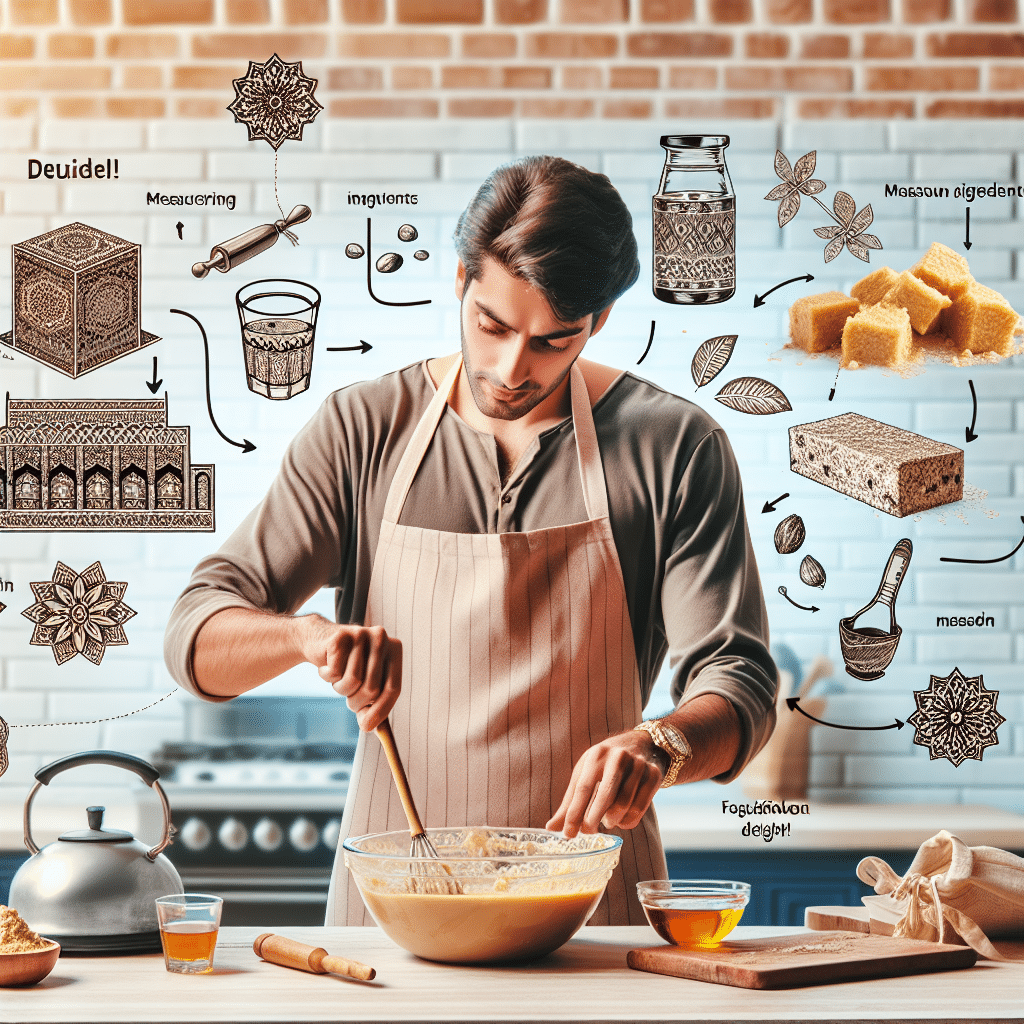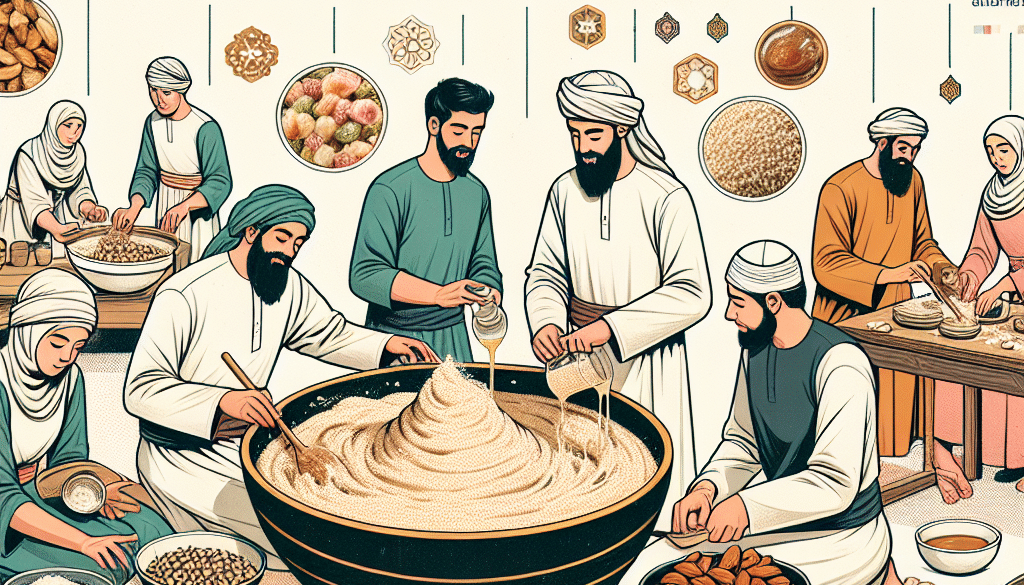Why Do Muslims Make Halva?
-
Table of Contents
- Halva in Muslim Culture: The Significance and Tradition
- The Cultural Significance of Halva
- Religious Observances and Halva
- Symbolism and Shared Blessings
- Regional Varieties of Halva
- Halva in Social and Religious Gatherings
- Case Studies: Halva in Practice
- Health Benefits and Nutritional Value
- Conclusion: The Enduring Legacy of Halva
- Discover ETprotein’s High-Quality Protein Products
Halva in Muslim Culture: The Significance and Tradition

Halva, a dense, sweet confection, is deeply rooted in the culinary traditions of various cultures, including those in the Middle East, South Asia, and the Balkans. Among Muslims, halva is not just a dessert; it holds cultural and religious significance that transcends its taste and texture. This article explores the reasons behind the importance of halva in Muslim traditions, its various forms, and the occasions on which it is prepared and consumed.
The Cultural Significance of Halva
Halva, derived from the Arabic word ‘halwa’, meaning sweet, is a term used to describe many dense, sweet desserts made with a variety of ingredients such as sesame seeds, flour, or semolina. The preparation of halva varies from region to region, with each culture adding its unique touch to this versatile treat.
Religious Observances and Halva
In the Muslim world, halva is often associated with religious observances and ceremonies. It is commonly made during the holy month of Ramadan, on Eid al-Fitr, and Eid al-Adha, as well as for commemorations of the dead, known as ‘Fatiha’.
- Ramadan: During Ramadan, Muslims fast from dawn until sunset, and halva serves as a rich, energy-dense food that helps to sustain them through the long hours of fasting.
- Eid Celebrations: Halva is also a festive food, prepared to celebrate Eid al-Fitr, the festival marking the end of Ramadan, and Eid al-Adha, the festival of sacrifice.
- Mourning Rituals: In some Muslim cultures, halva is prepared during mourning periods and distributed among the poor and the attendees as a form of charity and remembrance of the deceased.
Symbolism and Shared Blessings
Halva is not merely a sweet treat; it carries symbolic meanings of sweetness in life, shared blessings, and communal solidarity. The act of preparing and sharing halva is a gesture of goodwill and is believed to bring blessings to both the giver and the receiver.
Regional Varieties of Halva
Across the Muslim world, halva takes on various forms, each with its distinct ingredients and preparation methods. Here are a few examples:
- Tahini Halva: Popular in the Middle East, this type of halva is made from tahini (sesame paste) mixed with sugar or honey and often includes nuts or dried fruit.
- Flour Halva: In South Asia, halva is often made with roasted flour, clarified butter, and sugar, sometimes flavored with cardamom or saffron.
- Semolina Halva: In Turkey and Greece, halva made with semolina is common, often enriched with pine nuts and flavored with rosewater or orange blossom water.
Halva in Social and Religious Gatherings
Halva is more than a dessert; it is a social glue that brings people together during both joyous and somber occasions. It is a common sight at weddings, birth celebrations, and religious gatherings, symbolizing the sharing of life’s sweetness and the community’s unity.
Case Studies: Halva in Practice
Several case studies highlight the role of halva in Muslim societies:
- In Iran, halva is traditionally served at funerals and during the holy month of Muharram as a form of charity and to honor the memory of Imam Hussein.
- In Pakistan and India, ‘Sooji ka Halva’ (semolina halva) is often prepared during religious festivals and as part of the ‘Langar’, a community kitchen in Sikh and Sufi shrines where food is served to all visitors without distinction.
- In the Balkans, halva is often made to mark the end of the fasting period during Ramadan and is shared among neighbors and family members.
Health Benefits and Nutritional Value
While halva is a sweet treat, it also has nutritional benefits. Many types of halva are rich in protein, healthy fats from nuts and seeds, and provide quick energy. However, due to its high sugar content, it should be consumed in moderation.
Conclusion: The Enduring Legacy of Halva
Halva is a testament to the rich culinary and cultural tapestry of the Muslim world. Its preparation and consumption during religious and social events underscore its significance as a symbol of shared human experiences. Whether it’s marking a spiritual occasion or simply enjoying a sweet moment, halva remains an integral part of Muslim heritage and communal life.
Discover ETprotein’s High-Quality Protein Products
For those interested in incorporating high-quality protein into their diets, ETprotein offers a range of organic and vegan protein products. Whether you’re looking to enhance your culinary creations or seeking nutritional supplements, ETprotein’s diverse offerings can meet your needs. Their products are characterized by a neutral taste, non-GMO, and allergen-free attributes, with L-(+)-Ergothioneine purity over 98%, making them an excellent choice for health-conscious consumers.
About ETprotein:
ETprotein, a reputable protein and L-(+)-Ergothioneine (EGT) Chinese factory manufacturer and supplier, is renowned for producing, stocking, exporting, and delivering the highest quality organic bulk vegan proteins and L-(+)-Ergothioneine. They include Organic rice protein, clear rice protein, pea protein, clear pea protein, watermelon seed protein, pumpkin seed protein, sunflower seed protein, mung bean protein, peanut protein, and L-(+)-Ergothioneine EGT Pharmaceutical grade, L-(+)-Ergothioneine EGT food grade, L-(+)-Ergothioneine EGT cosmetic grade, L-(+)-Ergothioneine EGT reference grade and L-(+)-Ergothioneine EGT standard. Their offerings, characterized by a neutral taste, non-GMO, allergen-free attributes, with L-(+)-Ergothioneine purity over 98%, 99%, cater to a diverse range of industries. They serve nutraceutical, pharmaceutical, cosmeceutical, veterinary, as well as food and beverage finished product distributors, traders, and manufacturers across Europe, USA, Canada, Australia, Thailand, Japan, Korea, Brazil, and Chile, among others.
ETprotein specialization includes exporting and delivering tailor-made protein powder and finished nutritional supplements. Their extensive product range covers sectors like Food and Beverage, Sports Nutrition, Weight Management, Dietary Supplements, Health and Wellness Products, and Infant Formula, ensuring comprehensive solutions to meet all your protein needs.
As a trusted company by leading global food and beverage brands and Fortune 500 companies, ETprotein reinforces China’s reputation in the global arena. For more information or to sample their products, please contact them and email sales(at)ETprotein.com today.














